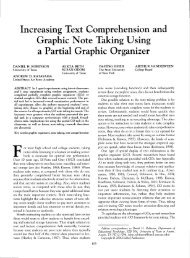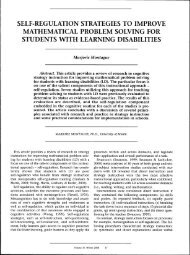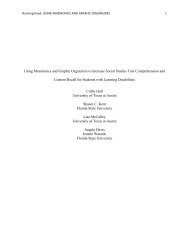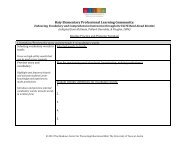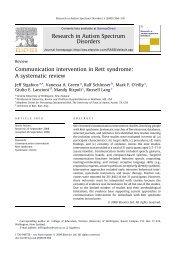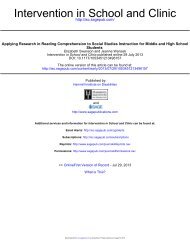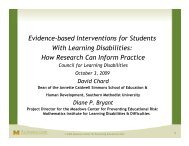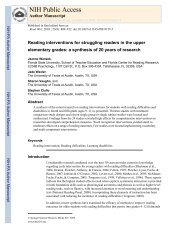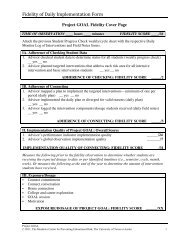- Page 1 and 2:
Effective Instruction for Middle Sc
- Page 3 and 4:
Effective Instruction for Middle Sc
- Page 5 and 6:
ContentsForeword: A Schoolwide Appr
- Page 7 and 8:
Word Learning Sample Lesson:Teachin
- Page 9 and 10:
Position-Reason 345Semantic Feature
- Page 11 and 12:
Foreword:A Schoolwide Approachto Re
- Page 13 and 14:
Figure 2. A Schoolwide Reading Inte
- Page 15 and 16:
Tier I: Schoolwide Strategies and R
- Page 17 and 18:
Elements of Strategic InterventionI
- Page 19 and 20:
DEVELOP A PLAN FOR COLLECTING, MANA
- Page 22 and 23:
ehind, an equally valuable goal is
- Page 24 and 25:
Cloze testComprehensionDiagnosticas
- Page 26 and 27:
16The Reading Teacher’s Sourceboo
- Page 28 and 29:
Figure 4. Guide to Reading Assessme
- Page 30 and 31:
instruction in these areas is not d
- Page 32 and 33:
22The Reading Teacher’s Sourceboo
- Page 34 and 35:
It may be useful for teachers to ta
- Page 36 and 37:
6. Mark errors, including mispronun
- Page 38 and 39:
who can read it with only 82 percen
- Page 40 and 41:
Figure 8. Progress monitoring Track
- Page 42 and 43:
32The Reading Teacher’s Sourceboo
- Page 44 and 45:
Figure 10. Categories of Secondary
- Page 46 and 47:
The steps Miss Lopez followed to fo
- Page 48 and 49:
promote use of ineffective strategi
- Page 50 and 51:
1st 10Minutes2nd 10 Minutes3rd 10 M
- Page 52 and 53:
Figure 15. Sample Instructional Seq
- Page 54 and 55:
By middle school, some students who
- Page 56 and 57:
• Statement of objective or purpo
- Page 58 and 59:
In summary, when presenting new inf
- Page 60 and 61:
Error-correction example (Carnine,
- Page 62 and 63:
Periodic Review/Multiple Opportunit
- Page 64 and 65:
Positive feedbackQuick pacing ofles
- Page 66 and 67:
Examples of scaffolding include but
- Page 68 and 69:
• You are following the steps of
- Page 70 and 71:
Another aspect of motivation is rel
- Page 72 and 73:
their reading. It is helpful for an
- Page 74 and 75:
64The Reading Teacher’s Sourceboo
- Page 76 and 77:
Figure 18. Strategies Used by Effec
- Page 78 and 79:
taught to self-generate questions i
- Page 80 and 81:
and 1-2 “what” proper nouns.For
- Page 82 and 83:
about what you read. You’ll be ab
- Page 84 and 85:
Independent PracticeGrouping: Partn
- Page 86 and 87:
efore- and during-readingcomprehens
- Page 88 and 89:
Daily Review1. Preteach important p
- Page 90 and 91:
Guided PracticeGrouping: Whole clas
- Page 92 and 93:
efore- and during-readingcomprehens
- Page 94 and 95:
Model and Teach1. Model creating
- Page 96 and 97:
Monitor Student LearningEach time s
- Page 98 and 99:
efore- and during-readingcomprehens
- Page 100 and 101:
State Objective/PurposeTell student
- Page 102 and 103:
Independent PracticeGrouping: Partn
- Page 104 and 105:
during-reading sample lessonMental
- Page 106 and 107:
3. Tell the students that you are g
- Page 108 and 109:
GeneralizationTeacher:Can anyone th
- Page 110 and 111:
during-reading sample lessonMain Id
- Page 112 and 113:
Why might a dominant person give an
- Page 114 and 115:
• After reading an additional par
- Page 116 and 117:
Figure 28. Sample Partially Complet
- Page 118 and 119:
during readingIdentifying Text Stru
- Page 120 and 121:
Figure 31. Elements of Expository T
- Page 122 and 123:
Description/CategorizationHow somet
- Page 124 and 125:
2. Identify the overarching text st
- Page 126 and 127:
Figure 35. Sample Story Map.Adapted
- Page 128 and 129:
Figure 38. Sample Partially Complet
- Page 130 and 131:
Figure 42. Temporal Sequencing Exam
- Page 132 and 133:
Figure 49. Problem-Solution-Result
- Page 134 and 135:
State Objective/PurposeTeacher:Toda
- Page 136 and 137:
Teacher:Once we have underlined the
- Page 138 and 139:
Monitor Student LearningCheck that
- Page 140 and 141:
after-reading sample lessonWrap-up/
- Page 142 and 143:
Students:…him.b. Choral reading (
- Page 145 and 146:
Figure 53. Main Idea Log.MAIN IDEA
- Page 147 and 148:
Chapter 7Vocabularyterms to knowAca
- Page 149 and 150:
Figure 54. Which Words Do I Teach?W
- Page 151 and 152:
Here is a helpful checklist for pla
- Page 153 and 154:
• Have students keep a journal of
- Page 155 and 156:
PreparationPreview the text, lookin
- Page 157 and 158:
4. If students have difficulty gene
- Page 159 and 160:
AFTER READINGGrouping: Partners1. W
- Page 161 and 162:
Independent Practice1. Before readi
- Page 163 and 164:
Figure 62. Sample Criteria Chart fo
- Page 165 and 166:
word knowledge sample lessonSemanti
- Page 167 and 168:
STATE OBJECTIVE/PURPOSETeacher:Toda
- Page 169 and 170:
Teacher:Now across the top, we are
- Page 171 and 172:
A finished chart may look like the
- Page 173 and 174:
Allow students to look at their cha
- Page 175 and 176:
Figure 71. Sample Vocabulary Writin
- Page 177 and 178:
Figure 73. Semantic Feature Analysi
- Page 179 and 180:
ObjectiveStudents will develop a de
- Page 181 and 182:
4. Model completing the Frayer Mode
- Page 183 and 184:
Student:If we don’t really unders
- Page 185 and 186:
word consciousnesssample lessonPrep
- Page 187 and 188:
2. Ask students to make (with partn
- Page 189 and 190:
Monitor Student LearningDuring the
- Page 191 and 192:
ObjectiveThe students will use prio
- Page 193 and 194:
For example, I might think, “I se
- Page 195 and 196:
GeneralizationTeacher:Did thinking
- Page 197 and 198:
Your completed chart might look lik
- Page 199 and 200:
• Decode words quickly and accura
- Page 201 and 202:
ObjectiveStudents will recognize th
- Page 203 and 204:
Write the meaning “to carry” un
- Page 205 and 206:
Independent PracticeGrouping: Partn
- Page 207 and 208:
Figure 82. Sample Word Part Clue Ev
- Page 209 and 210:
Figure 84. Common Suffixes.SUFFIX%
- Page 211 and 212:
word learning sample lessonUsing Co
- Page 213 and 214:
Materials• Types of Context Clues
- Page 215 and 216:
may consider developing sample sent
- Page 217 and 218:
Figure 91. Context Clue Strategy.1.
- Page 219 and 220:
Figure 94. Sample Context Clues Cha
- Page 221 and 222:
word learning sample lessonThe Voca
- Page 223 and 224:
Model and TeachGrouping: Whole clas
- Page 225 and 226:
Accept responses.raise your hand if
- Page 227 and 228:
Teacher:Today I am going to show yo
- Page 229 and 230:
4. Guide students through Step 3 of
- Page 231 and 232:
Chapter 8Fluencyterms to knowAutoma
- Page 233 and 234:
Figure 98. Accuracy Guidelines.Inde
- Page 235 and 236:
Partner ReadingAcknowledgmentsBased
- Page 237 and 238:
Partner Reading Routine1. Partner 1
- Page 239 and 240:
Practice, Practice, PracticeAllow s
- Page 241 and 242:
Progress MonitoringThe most efficie
- Page 243 and 244:
Chapter 9Word RecognitionAcknowledg
- Page 245 and 246:
What do students need to know about
- Page 247 and 248:
3. Read each word part. Remember th
- Page 249 and 250:
A sample sequence for teaching the
- Page 251 and 252:
It is expected that a comprehensive
- Page 253 and 254:
Word Analysis (WA) Instruction/Word
- Page 255 and 256:
.Vocabulary InstructionCharacterist
- Page 257 and 258:
Listening ComprehensionCharacterist
- Page 259 and 260:
Students Who Do Not RespondAdequate
- Page 261 and 262:
come to a word that you don’t kno
- Page 263 and 264:
word because it is made from the wo
- Page 265 and 266:
The next word is piano. Remember th
- Page 267 and 268:
word Recognition sample lessonThe M
- Page 269 and 270:
at the end of the word. Let’s rea
- Page 271 and 272:
Teacher:I’m going to show you how
- Page 273 and 274:
Point to “press”.Read the part.
- Page 275 and 276:
GeneralizationTeacher:How might you
- Page 277 and 278:
Part 4AppendixAppendix ContentsPlan
- Page 279 and 280:
Context Clue Strategy 361Types of C
- Page 281 and 282:
Planning Checklist for Implementing
- Page 283 and 284:
DEVELOP A SCHOOLWIDE PLAN FOR IMPLE
- Page 285 and 286:
Characteristics of Effective Reader
- Page 287 and 288:
Accuracy Guidelines# of words read
- Page 289 and 290:
Sample Instructional Sequence for R
- Page 291 and 292:
Guide to Adapting InstructionAdapta
- Page 293 and 294:
Previewing Planning SheetPLANNING S
- Page 295 and 296:
Level 1 “Right There” Questions
- Page 297 and 298:
Level 2 “Putting It Together” Q
- Page 299 and 300:
Level 3 “Making Connections” Qu
- Page 301 and 302:
Previewing and Questioning Learning
- Page 303 and 304:
Question Cards: Red (Front)Level 1
- Page 305 and 306:
Question Cards: Red (Back)Level 1
- Page 307 and 308:
Question Cards: White (Front)Level
- Page 309 and 310: Question Cards: White (Back)Level 2
- Page 311 and 312: Question Cards: Blue (Front)Level 3
- Page 313 and 314: Question Cards: Blue (Back)Level 3
- Page 315 and 316: MENTAL IMAGERY LOGTitle:Paragraph 1
- Page 317 and 318: MAIN IDEA FORMName(s) _____________
- Page 319 and 320: MAIN IDEA LOGTitle of passage: ____
- Page 321 and 322: Signal WordsCause-EffectHow or why
- Page 323 and 324: Identifying Text StructureIf the au
- Page 325 and 326: Elements of Narrative TextExamples
- Page 327 and 328: Elements of Expository TextExamples
- Page 329 and 330: Story MapExposition:Conflict:Rising
- Page 331 and 332: Main Idea WebMain IdeaThe Reading T
- Page 333 and 334: K-L ChartKnowWhat do I already know
- Page 335 and 336: Cause-Effect Chart (Herringbone)Cau
- Page 337 and 338: Cause-Effect Chart (Semantic Map)Ca
- Page 339 and 340: Cause-Effect Chart (Basic)The Readi
- Page 341 and 342: Chronological Ordering/SequencingTh
- Page 343 and 344: Temporal SequencingThe Reading Teac
- Page 345 and 346: Compare/ContrastThe Reading Teacher
- Page 347 and 348: Description (Web)word or ideaThe Re
- Page 349 and 350: Description (Chart)The Reading Teac
- Page 351 and 352: Problem-SolutionSolutionProblemSolu
- Page 353 and 354: Problem-Solution-ResultProblemSolut
- Page 355 and 356: Position-ReasonPositionReason 1Reas
- Page 357 and 358: Semantic Feature Analysis GridConce
- Page 359: Frayer ModelNonAdapted with permiss
- Page 363 and 364: Word Part Clue Evaluation ChartWORD
- Page 365 and 366: Common PrefixesPREFIX% of AllPrefix
- Page 367 and 368: Common SuffixesSUFFIX% OF ALLSUFFIX
- Page 369 and 370: Common Greek and Latin RootsROOT OR
- Page 371 and 372: Context Clue Strategy1. Reread the
- Page 373 and 374: Types of Context CluesType ofContex
- Page 375 and 376: Guide for Context Clues PracticeUnf
- Page 377 and 378: If you read a word that you do not
- Page 379 and 380: Word _________________________Vocab
- Page 381 and 382: Fluency ChartName:15014013012011010
- Page 383 and 384: SyllableTypeSyllable TypesExamplesC
- Page 385 and 386: Multisyllable Word Reading Strategy
- Page 387 and 388: Guidelines for Reviewing a Reading
- Page 389 and 390: Word Analysis (WA) Instruction/Word
- Page 391 and 392: .Vocabulary InstructionCharacterist
- Page 393 and 394: Comprehension InstructionCharacteri
- Page 395 and 396: ReferencesAnders, P. L. & Bos, C. S
- Page 397 and 398: Diamond, L., & Gutlohn, L. (2006).
- Page 399 and 400: Kame’enui, E. J., & Carnine, D. W
- Page 401 and 402: Rumelhart, D. E. (1980). Schemata:
- Page 403 and 404: Vaughn Gross Center for Reading and
- Page 405 and 406: Resourcesfor the Reading TeacherNOT
- Page 407 and 408: Burns, P. C., & Roe, B. D. (2002).
- Page 409 and 410: Moats, L. C. (2000). Speech to prin



